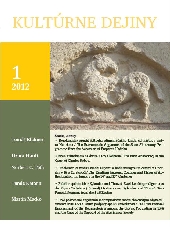Zabeler spricht über Xylander und Thurzó. Zwei Leichenpredigten aus der Zips
Zabeler’s (Funeral) Orations over Xylander and Thurzó. Two Funeral Sermons from the Spiš Region
Author(s): Tünde KatonaSubject(s): History
Published by: VERBUM - vydavateľstvo Katolíckej univerzity v Ružomberku
Keywords: Hungary; Slovakia; Spiš Region; Early Modern Age; German Reformation; Funeral Sermons
Summary/Abstract: The 1970s witnessed an upsurge in the socio-historically and rhetorically informed research on funeral sermons, which represent a unique segment of occasional poetry. The results of German scholarship had a lasting effect on the study of Hungarian funeral sermons, whether they were originally written in Hungarian, Latin, German, or Slovakian. Nonetheless, up to now, comprehensive findings have only become available concerning sermons in Hungarian. The prevailing demand for interdisciplinary approaches emerging in the early 2000s directed philological attention towards the genre, which was traditionally investigated by historians, and, obviously, theologians. It is by now generally accepted that the latest problems encountered in mediaeval and early modern studies cannot be answered without the assistance of sources like the funeral sermon, which, although by nature called for oral performance, were preserved in print. Besides the more obvious questions triggered by the text type (like innovation versus tradition in the sermon’s structure, the set of rhetorical devices applied in it, the biographical data about the departed and the remaining ones etc.), an exploration into the unique medial and communicative ideas motivating the author and/or the commissioning party also seems to be promising. The two German sermons forming the corpus of the paper were selected on the following basis: 1) they are from the same author, and they are within a time span of half a decade (around the 1620s); 2) because the author, Peter Zabeler (or Zabler) takes leave from one of the representative figures of his own Lutheran confession, Stephanus Xylander (Holtzmann), and from the aristocrat Stanislaus Thurzó; 3) both are closely connected to Levoča (Leutschau, Löcse), which was a city of great contemporary political, economical and cultural importance.
Journal: Kultúrne dejiny
- Issue Year: 2012
- Issue No: 1
- Page Range: 52-59
- Page Count: 8
- Language: German

